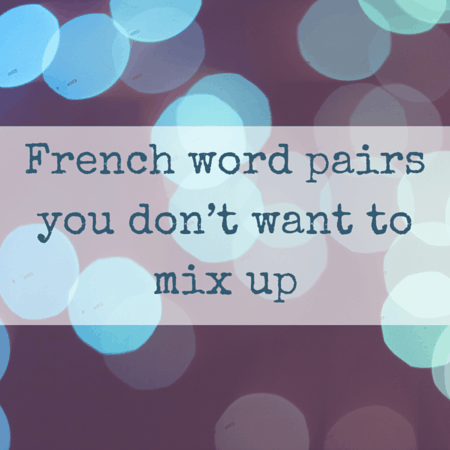Anyone who has ever tried to learn a foreign language gets to a point where they’ve become conversational but don’t sound natural when they speak. I’m not talking about an accent here. I’m talking about speech patterns, word choice and other natural little things that flow out of a native speaker’s mouth. It’s the difference between hearing someone speak and thinking, “Oh, he speaks well for a foreigner” and, “Oh, you can tell he’s been living here for years.” As a foreigner learning French, I’ve picked a few little things along the way and am sharing these tips to make your French sound more natural.
5 Tips to make your French more natural (VIDEO)
Back in the day, I had a friend who did the TAPIF program my year (2009-10), who at the time, spoke better French than me. He had a pretty significant accent in French but his French just flowed. It sounded natural and confident and I wanted to be like him.
If you can hold a conversation in French and your level is already intermediate plus, it’s time to start working on sounding natural. Some of these will come, well, naturally as you converse with other French speakers and pick up their habits. Others will have to be practiced and will come with time. For me, I think at first I was so fixated on speaking properly that I felt like I was breaking all the rules by implementing the tips below.
Drop the ne? “Isn’t that wrong?” I’d think to myself.
I figured I was making a bunch of errors in other areas of my sentences that I at least wanted to speak properly and implement the things I did know were correct, like making sure my negative sentences had a ne and a pas. Speaking naturally and properly go hand in hand, so if you don’t want to sound like you learned French from a textbook, listen up!
If we turn to Tom for a minute, his quest to learn English is ongoing and he’s picked up tips to sound more natural in English. Tom used to say, “I am going to go to the store” and pronounce each word beautifully. One day I told him straight up that he sounded like a robot, so just say, “I’m gonna go to the store.” Ever since, he knows that “gonna” sounds more natural in speech than “going to.” It’s the same in French.
And what about your accent? Remember, an accent isn’t a problem at all if you’re able to be understood. Plenty of people speak 100% naturally with heavy accents, so do not stress about that at all!
French accents sounds great in French unless you say one of these words! >>
There are a bunch of tips that can help your French to sound more natural but I’m clipping the list at 5 today.
1. Drop the “ne” in negative sentences
When you’re constructing a negative sentence, normally you bracket your verb with a ne and pas (simplifying this so you get the main idea). It’s the English equivalent of not. So “I don’t like carrots” is written Je n’aime pas les carottes. BUT if you are verbalizing this to someone, you just say J’aime pas les carottes. In informal speech, you can drop the “ne” every time and sound much more natural. Forget what you learned in school!
2. Put some words together. Tu as becomes T’as, etc.
We do this in English all the time when we speak. Gonna, gotta, dontcha, wontcha. Like poor Tom circa 2009, you’ll sound like a robot if you pronounce ever single syllable of every single word. Normally the u is dropped in tu as and tu es so Tu as becomes the contraction t’as and tu es becomes t’es.
Remember, this is only in spoken French. You’d always write tu as and tu es if you want it to be proper French. Also, je ne sais pas becomes shay in speech. There are a bunch of others and this will come automatically the more you practice speaking French.
3. Use “on” instead of “nous” when you mean “we”
On is a third-person singular pronoun that you commonly learn with il/elle/on. It generally means “one” does something. But it can also mean “we.” In school, we’re taught that “nous” means “we” and it absolutely does. There’s nothing wrong with using it. When the president addresses the nation on TV, he says nous allons but when we’re speaking to each other casually? Opt for the “on.”
4. Use salut instead of bonjour and au revoir in casual situations
Salut can mean hey (more casual than saying bonjour) but it can also mean “see ya” (more casual way of saying au revoir). When I leave the gym, the staff sends me off with a friendly salut. Be aware of the context though. Salut is fine among friends but in a professional context or with people you don’t know, it’s better to stay formal.
5. Sprinkle in some French sounds as well as common conversational words
So this one is two parts. To sound natural, you first of all need some French language sounds. I cover these pretty extensively (with audio) on this post called “The strange noises French people make” from a few years ago, which is still one of the most-read posts on this site. Throw in one or two only where it’s natural — don’t overuse them or you risk sounding ridiculous.
In addition to sounds, you need to know how to use words/phrases like en fait, franchement, c’est vrai que…, ben oui, effectivement. When used properly, they’re super natural and very common in French speech.
*And my bonus tip*
No matter your current level, stand proud and speak with confidence. It’ll take you far. I think I might have mentioned a guy in my French class years ago who spoke with such confidence and conviction that none of us realized he was making tons of errors. Whenever he’d speak, he’d sit up straight, speak loudly and clearly and make eye contact. At the time, my level wasn’t good enough to know about all his mistakes, but my French teacher sure did! What did I learn from this? That speaking with authority makes a load of difference!
***
What tips have helped you to sound more natural in a foreign language?
P.S. If you’re a native French or English speaker and want a language partner, please head over to this post and leave a comment!










Such good points. Also: reflexive verbs are your friend. They allow things to happen, passively, without specifying who did something. Sometimes the translation seems odd: He was attacked = il s’est fait attaqué = he made himself be attacked. Huh? I mean, hein? Sometimes they’ll even say who did it, but not directly: Two guys attacked him = il s’est fait attaqué par deux mecs = he made himself be attacked by two guys. They never say: Deux mecs l’ont attaqué.
I brushed my teeth = je me suis brossée les dents = I brushed myself the teeth. Always les dents and not mes dents.
Oh yes, those are so tricky and I really have to think before conjugating — I’m sure I still mess up. They just don’t logically make sense to me. Oh French 😉
Très pertinent Diane ! Totally true ! I wish I read the same post about making my English more natural, one day 😉 love from France !!
I’m sure you do very well!!
Good advice to sound authentic. But, when I worked with French people, I said, “Je ne sais pas” and got some smirks because it was so formal and textbook, so I said, “should I say “shay pas?” and the guy I liked said, “no, it’s beautiful.” So, I kept saying it the proper way. I guess it’s like the proper English language being more beautiful in England than in the U.S. where we are very lax about it, using words like gonna and ain’t…then there’s weird words like “finna” instead of “gonna.” Very confusing to foreigners here, I’m sure.
Yeah, I think it depends on the person and situation and knowing what is best in the moment. Someone who can barely get 5 words out may not want to go with “gonna” instead of “going to” but sometimes even with an accent adding a few contractions sounds more natural. Thank you for commenting!
Great tips, Diane! I remember the first time I came to France in 2009 to study aboard and my French friends would tease me because I spoke such “textbook French.” It’s been a fun journey though learning how to “Frenchify” my French to sound more authentic. 🙂
Thank you! We all start somewhere so textbook French is better than 0 French. With time I think we start to sound less stiff and formal! Baby steps
Hey Diane, great tips! It’s what I tell my own students all the time! 🙂 Thanks for writing this useful post! Lisiane
Thanks for your great article Diane! I can imagine how confusing it is to learn French because most of the time, what your learn has nothing to do with what people do speak in real life. I guess this is the same with any language.
And do we want to talk about idioms??? 😉 I just wrote an article myself on French idioms and their explanation or equivalent in English and I had a lot of fun writing it! So I hope you’ll enjoy it too 🙂
http://www.vidalingua.com/blog/funny-french-idioms-explained-english.php
Great advice for a beginner like me. I just love French. I don’t know why I just fell in love with this language. and I want to be fluent in it as well thank u.
Using gonna and shoulda indicates a regional accent. Where I grew up we rarely used these contractions. I do not recommend people learning English use them.